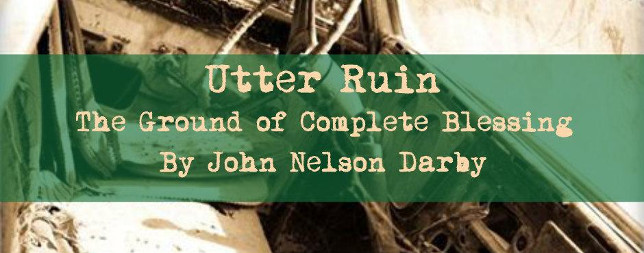By John Nelson Darby
I believe that which greatly keeps us from the strength of our joy, is our ignorance of the utter ruin of man. Not merely should we be acquainted with the evil into which the ruin has brought us, but also with the ruin itself. The moment that this ruin came into the world, everything went wrong. Not only has man gone wrong, but all his activities have gone wrong also.
Now, Christ has provided for us a way wherein the activities of the new man have their exercise. This is our own proper and peculiar portion; to have the mind of Christ, and to be brought into fellowship with God. But for the enjoyment of this, it is essential that we should be introduced into a knowledge of the complete apostasy of our own natural will. The purpose of God for His children is, that they should be associated with Him in His own joy, and to this end we must know Him. Now, the main sorrow of Christ's life was man's ignorance of God. God was never understood; but the poor sinner understood Him much better than the self-righteous Pharisee. Jesus came forth from the bosom of the Father, having the knowledge of His mind, knowing that God loved the poor sinner; not merely the sinner's joy in being blest, but God's joy in blessing him; and this is the joy in which God would have us to be associated with Himself. Another most blessed truth is, that we should be associated with Christ in His sufferings, "That the trial of our faith being much more precious than of gold that perisheth, though it be tried with fire, might be found unto praise, and honour, and glory, at the appearing of Jesus Christ." (1 Peter 1:7.)
The first departure of the believer from God, is a departure from the knowledge of his fulness in God and nearness to Him, his conscious sonship with God. If I am one with Christ, I must be as He is. If I have anything at all it must be what He has - what He is. There is no medium between being nothing in ourselves and being everything in Christ.
If I have no title of my own, if I am nothing but wretchedness in myself, and have no natural understanding of God's good-will to man, where is my claim? Therefore true humility is the knowing what I am in Christ. So the moment I say, I am not as Christ, I lose the knowledge of my glory in Him, and I stoop down to the flesh. This we see in John, when he fell down and worshipped the angel. Here was that voluntary humility and worshipping of angels which the Apostle warns us against. Had John remembered the glory he had in Christ he would not have done this; for "As he is, so are we in this world." (1 John 4:17.) J. N. D.
